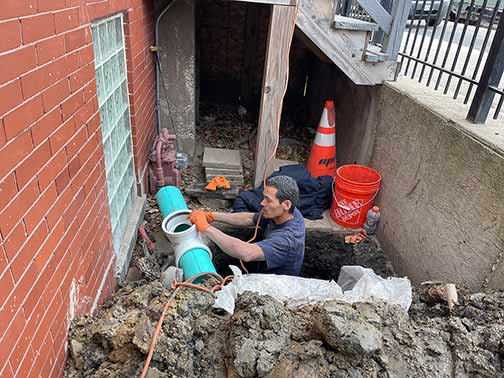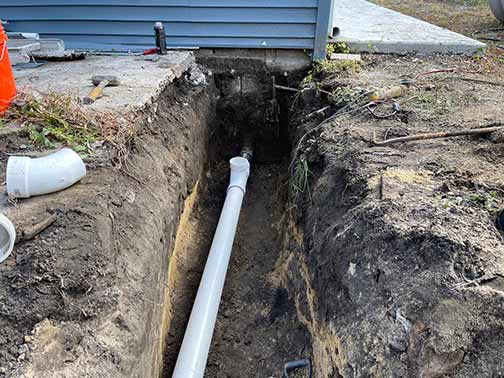
One of the first steps in determining whether to repair or replace your sewer line is understanding the signs and symptoms of sewer line problems. Common indicators include slow drains, frequent backups, foul odors, and unusual sounds coming from your plumbing system. Recognizing these warning signs early can help you address the issue before it escalates into a more significant problem.
Slow drains can indicate a blockage or buildup within the pipes, while frequent backups may suggest a more severe issue, such as a collapsed or broken sewer line. Foul odors emanating from drains or the yard can be a sign of a leak or crack in the sewer line, allowing sewage to escape. Unusual sounds, such as gurgling or bubbling noises, can indicate trapped air or blockages within the system.
Evaluating the Extent of the Damage: Professional Sewer Line Inspection
Once you have identified potential sewer line issues, the next step is to evaluate the extent of the damage. This can be done through a professional sewer line inspection, which often involves using a camera to visually assess the condition of the pipes. The inspection will reveal whether the damage is localized or widespread, which is crucial in deciding whether repair or replacement is the best course of action.
A sewer camera inspection allows plumbers to pinpoint the exact location and nature of the problem, whether it be root intrusion, cracks, or blockages. By thoroughly evaluating the condition of the sewer line, homeowners can make an informed decision on the most appropriate solution.
Repairing Your Sewer Line: Pros and Cons of a Cost-Effective Solution
Repairing your sewer line can be a cost-effective and less invasive solution, especially if the damage is minor and localized. Some of the advantages of sewer line repair include:
- Lower cost compared to full replacement
- Less disruption to your property and landscaping
- Quicker completion time
However, there are also some drawbacks to consider:
- May not be suitable for extensive damage or older pipes
- Potential for recurring issues if underlying problems are not addressed
- Limited lifespan of repairs compared to new pipes
When considering sewer line repair, it is essential to weigh the benefits and drawbacks carefully. While repairs can be a quick and cost-effective solution, they may not address underlying issues that could lead to future problems.
Additionally, repairs may not be suitable for older pipes that are prone to further deterioration. Homeowners should consider the long-term implications of repairs and whether they provide a lasting solution to their sewer line issues.

Replacing Your Sewer Line: Pros and Cons of a Long-Term Investment
Replacing your sewer line may be necessary if the damage is extensive or if the existing pipes are old and deteriorating. Some of the benefits of sewer line replacement include:
- Long-term solution with new, durable pipes
- Eliminates recurring issues and potential future repairs
- Improves overall plumbing system performance
However, sewer line replacement also has its disadvantages:
- Higher cost compared to repairs
- More invasive, potentially disrupting landscaping and property
- Longer completion time
Replacing a sewer line is a significant investment that can provide a more permanent solution to plumbing issues. New pipes are typically more durable and less prone to problems, reducing the need for future repairs. However, the higher cost and potential disruption to property and landscaping can be a drawback.
Homeowners should consider the long-term benefits of replacement, such as improved plumbing performance and reduced maintenance, when making their decision.
Cost Considerations: Repair vs. Replacement – Balancing Budget and Longevity
Cost is a significant factor in deciding whether to repair or replace your sewer line. Repairing a sewer line is generally less expensive than replacing it, but the long-term costs should also be considered. If repairs are likely to be needed frequently, the cumulative cost may eventually exceed the cost of a full replacement.
Additionally, the age and condition of your existing pipes can impact the overall cost-effectiveness of repairs versus replacement. For older pipes that are prone to recurring issues, replacement may be a more cost-effective solution in the long run. Homeowners should carefully evaluate their budget and the potential long-term savings when deciding between repair and replacement.
Environmental Impact: Repair vs. Replacement – Making Eco-Friendly Choices
Environmental considerations are becoming increasingly important in home maintenance decisions. Repairing a sewer line typically has a lower environmental impact compared to replacing it, as it involves less excavation and disruption to the surrounding area. However, if the existing pipes are old and prone to leaks, replacing them with newer, more efficient materials can ultimately be more environmentally friendly by reducing water waste and preventing contamination.
Newer pipes are often made from materials that are more resistant to corrosion and leaks, reducing the risk of environmental contamination. Homeowners should consider the environmental impact of their decision and choose the option that aligns with their sustainability goals.
Long-Term Plumbing Health: Making the Right Choice for Your Home
When deciding between repairing and replacing your sewer line, it’s essential to consider the long-term health of your plumbing system. While repairs may offer a quick and cost-effective solution, they may not address underlying issues that could lead to future problems. On the other hand, replacing your sewer line can provide a more permanent solution, but it comes with higher upfront costs and potential disruption to your property.
Ultimately, the best choice will depend on the specific circumstances of your sewer line and your long-term plumbing goals. Homeowners should evaluate the condition of their existing pipes, the extent of the damage, and their long-term maintenance goals when making their decision.
Contacting a Professional Plumber: Expert Advice for Informed Decisions
Given the complexity of sewer line issues, it’s always advisable to contact a professional plumber before making a decision. A qualified plumber can conduct a thorough inspection, provide expert advice on the best course of action, and ensure that any repairs or replacements are carried out to the highest standards.
By working with a nearby plumber, you can have peace of mind knowing that your sewer line is in good hands. Professional plumbers have the experience and expertise to accurately diagnose sewer line issues and recommend the most appropriate solution. They can also provide valuable insights into the pros and cons of repair versus replacement, helping homeowners make informed decisions.
Preventative Measures to Avoid Future Sewer Line Issues: Maintenance and Care Tips
Regardless of whether you choose to repair or replace your sewer line, taking preventative measures can help avoid future problems. Regular maintenance, such as cleaning your drains and sewer lines, can prevent blockages and buildup. Additionally, being mindful of what you flush down your toilets and drains can reduce the risk of clogs and damage.
Avoid flushing items such as grease, wet wipes, and feminine hygiene products, as they can cause blockages and damage to the sewer line. By taking these steps, you can extend the lifespan of your sewer line and maintain the overall health of your plumbing system. Homeowners should also consider scheduling regular inspections with a professional plumber to identify and address potential issues before they escalate.
Conclusion: Repair vs. Replacement – Making the Right Choice for Long-Term Plumbing Health
Choosing between repairing and replacing your sewer line is a significant decision that requires careful consideration of various factors, including the extent of the damage, cost, environmental impact, and long-term plumbing health. By understanding the pros and cons of each option and speaking with a professional plumber, you can make an informed decision that best suits your needs and ensures the long-term functionality of your plumbing system.
Homeowners should take the time to evaluate their specific circumstances, budget, and long-term goals when deciding between repair and replacement. By making the right choice, you can ensure the continued health and performance of your plumbing system for years to come.

